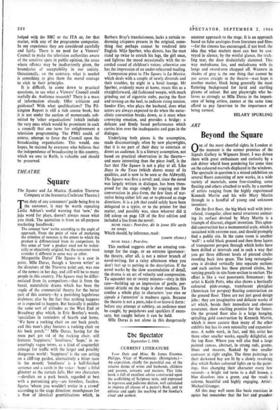THEATRE
Square
THE duty of any consumers' guide being first to the customer, it may be worth repeating Leslie Adrian's useful warning that 'new,' the juju word for plays, doesn't always mean what you think. The quotation is from an all-purpose marketing handbook:
The concept 'new' varies according to the angle of approach. From the point of view of marketing the criterion of newness is the extent to which the product is differentiated from its competitors. In this sense of 'new' a product need not be techni- cally or objectively original, but the consumer must consider it different in some way or other.
Marguerite Duras' The Square is a case in point. Mlle Duras, though a 'known writer' as the directors of the Traverse point out, was one of the newest in her day, and still will be to many people in this country. The Square may be differ- entiated from its competitors—that is from the banal, naturalistic drama which has been the staple of the commercial theatre for the better part of this century—by a punishing lugubrious drabness; also by the fact that nothing happens or is expected to happen. But basically it peddles the same sort of attitudes as the West End or Broadway play which, in Eric Bentley's words, 'specialises in reminders of hearth and home. "We have a rocking chair on our back porch; and this man's play features a rocking chair on his back porch."' Mlle Duras, having for the most part got rid of the rocking chair, still features 'happiness,' Ioneliness,"hope,' in re- assuringly vague terms, as a kind of counterfeit coinage for traffic with the larger and possibly dangerous world : 'happiness' is the sun setting on a cliff-top garden, alternatively a bitter taste in the mouth; 'loneliness' is a half-finished sentence and a catch in the voice : 'hope' a fitful glimmer as the curtain falls. Her two characters —derelicts on a park bench, regarded at best with a patronising pity—are formless, faceless, figures 'whom you wouldn't notice in a crowd' according to the stage direction; mouthpieces for a flow of identical generalisations which, in
Barbara Bray's translationese, lacks a certain re- deeming crispness present in the original, some- thing that perhaps cannot be rendered into English. Milo Sperber, who directs, has the man stand up twice to stretch his legs, the girl once, and lightens the mood occasionally with the re- corded sound of children's voices; otherwise one has the impression of an under-rehearsed reading.
Companion piece to The Square is La Musica, which deals with a couple of newly divorces and their troubles, by night in a hotel lounge. Mr Sperber, evidently more at home, treats this as a straightforward, old fashioned weepie, with much grinding out of cigarette stubs, pacing the floor and turning on the heel, to indicate rising tension. Sandor Eles, who plays the husband, does what actors are always expected to do when the natur- alistic convention breaks down, as it must when conveying emotion, and provides a bridge: a delicate and firmly based performance which carries him over the inadequacies and gaps in the dialogue.
Underlying both pieces is the assumption, made disconcertingly often by new playwrights, that it is no part of their duty to entertain or divert an audience. It is a literary assumption, not based on practical observation in the theatre— and more interesting than the piece itself, is the fact that The Square is not a play at all. Like Days in the Trees (which shares many of its qualities, and is now to be seen at the Mdwych), The Square was first a novel; and, since the novel was largely written in dialogue, has been trans- posed for the stage simply by copying out the conversation in play-form, the few lines of nar- rative being either left out or re-phrased as stage directions. It is a job that could safely have been delegated to a typist, or to the printer for that matter, and possibly was, since whoever did it fell asleep on page 128 of the first edition and included a line from the novel:
JEUNE FILLE : Peut-etre, dit la jeune flue apres tin temps.
Which should, by inference, read :
(cowrie silence.) JEUNE F1LLE Peut-etre.
This method suggests either an amazing con- tempt for the stage, or an extreme ignorance: the theatre, after all, is not a minor branch of novel-writing, for a rainy afternoon when you don't feel up to putting in the description. If the novel works by the slow accumulation of detail, the drama is an art of velocity and compression. To squander ten or twenty minutes—sixty in this case—building up an impression of gentle, per- sistent drizzle on the stage is sheer madness. To signale a l'attention' is madness again. Because confine a whole play to characters `que rien ne the theatre is not a pure,-take-it-or-leave-it form: before any attempt at subtlety, an audience must be caught, by peepshows and sparklers if neces- sary, but caught before it can be held.
Mlle Duras is not alone in this dangerously
amateur approach to the stage. It is an approach based on false analogies from literature and films —for the cinema has encouraged, if not bred, the idea that what matters most can best be con- veyed in silence, by the wistful glance, the trick- ling tear, the door disdainfully slammed. This way melodrama lies, and melodrama with its lungs and sword-arm chopped off. Wanness in shades of grey is the one thing that cannot be put across straight in the theatre—wan hope is another matter, black being generally the most flattering background for lurid and startling gleams of colour. But any playwright who be- lieves as strongly as Mlle Duras in the import- ance of being artless, cannot at the same time afford to pay lipservice to the importance of being earnest.
HILARY SPURLING






























 Previous page
Previous page